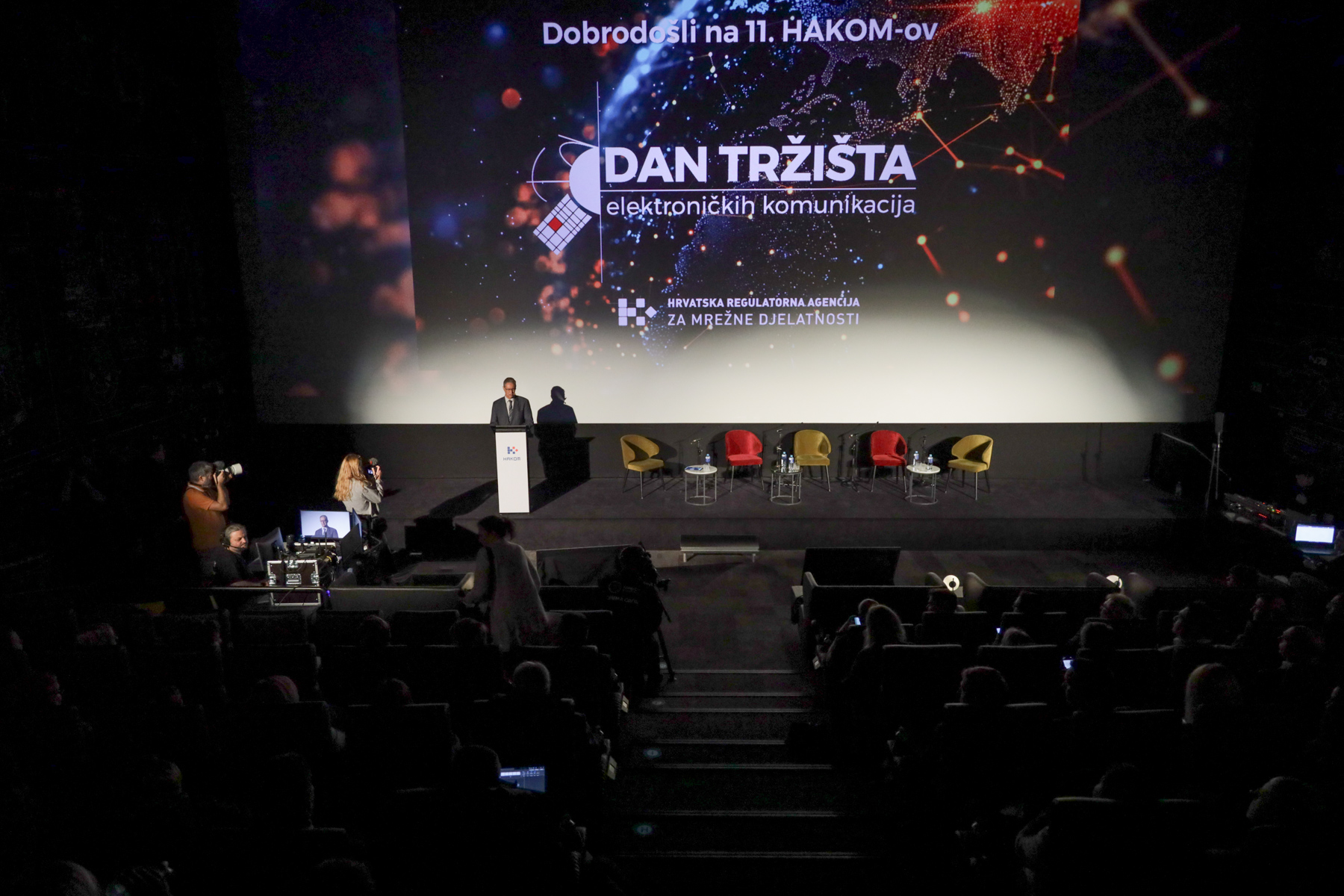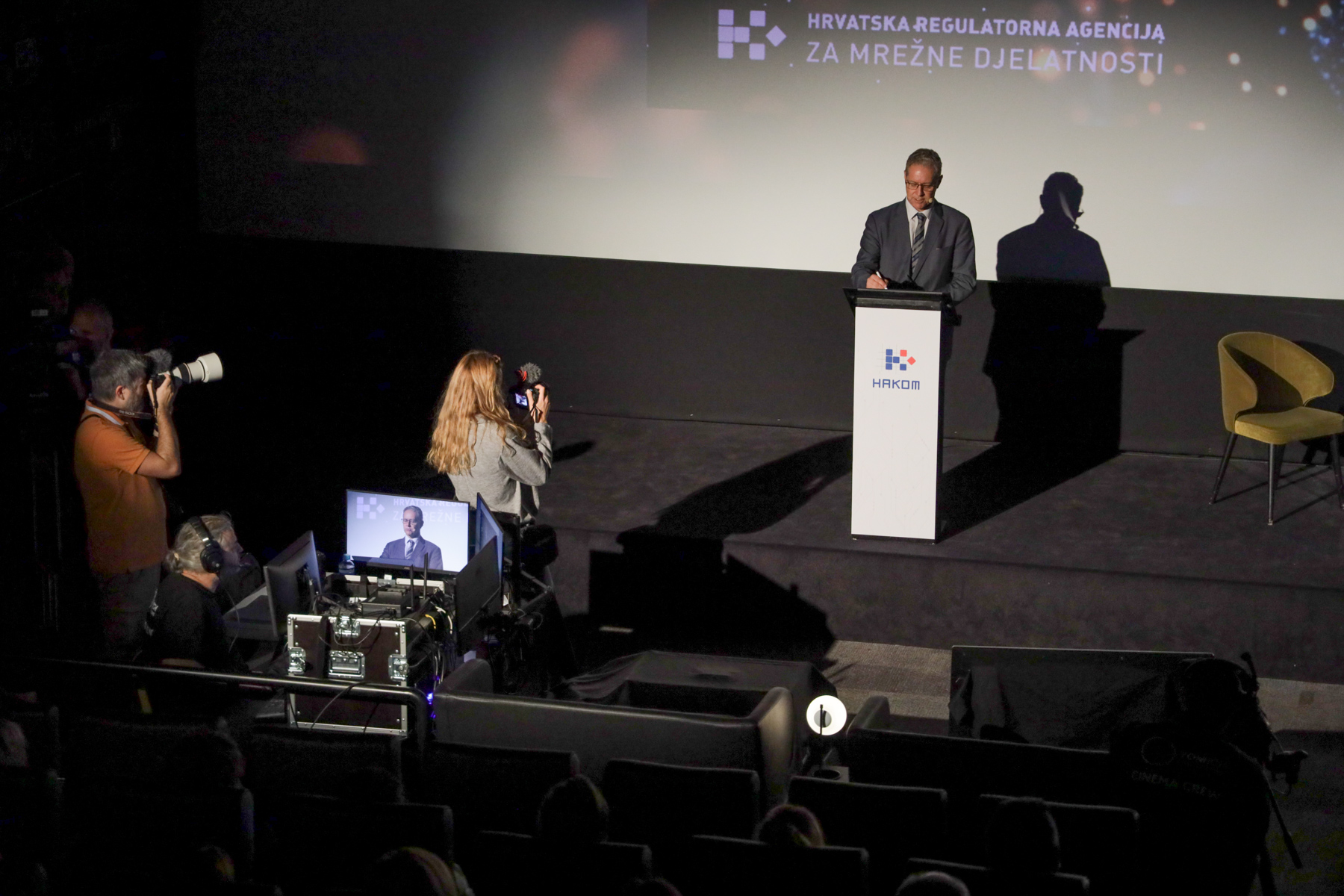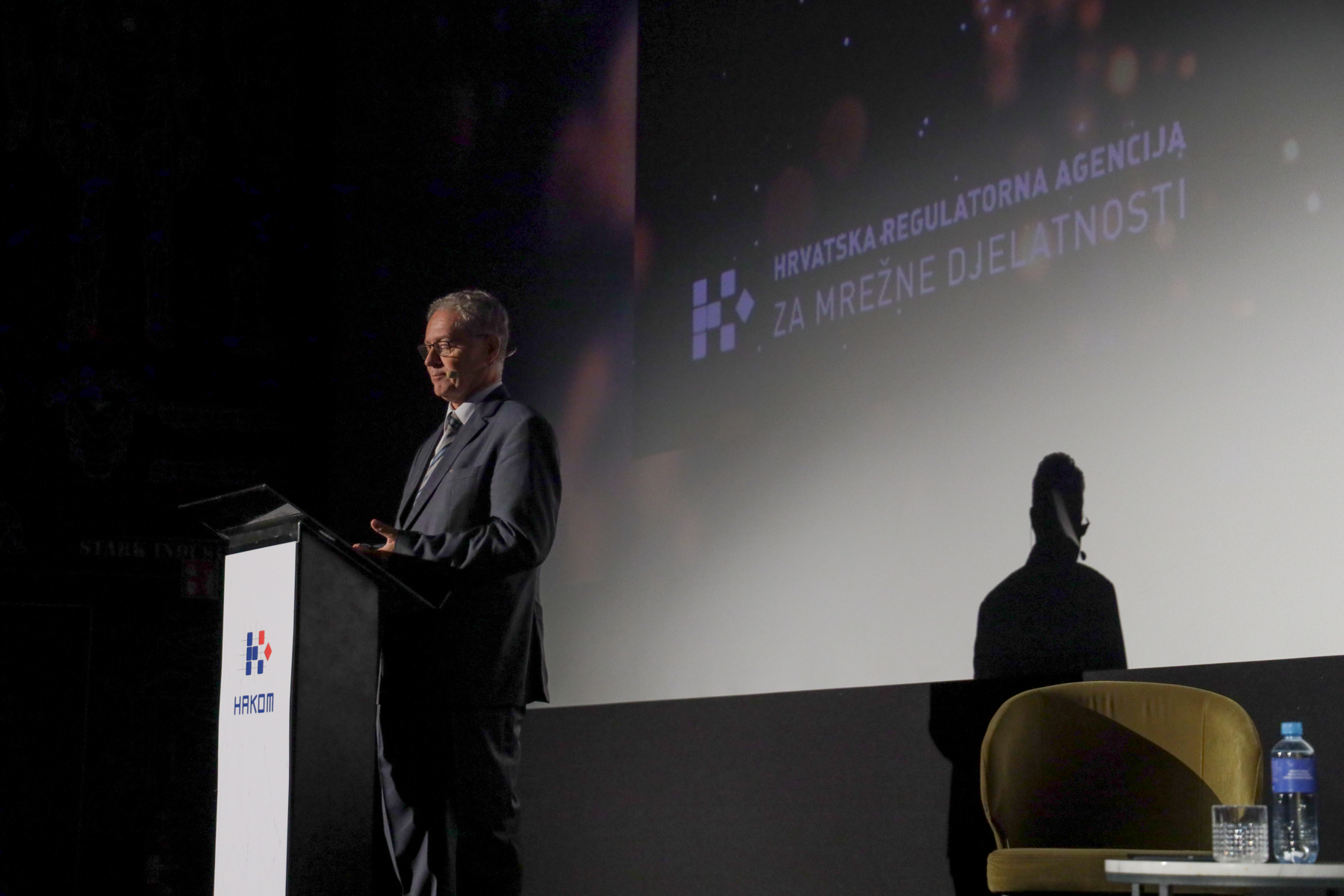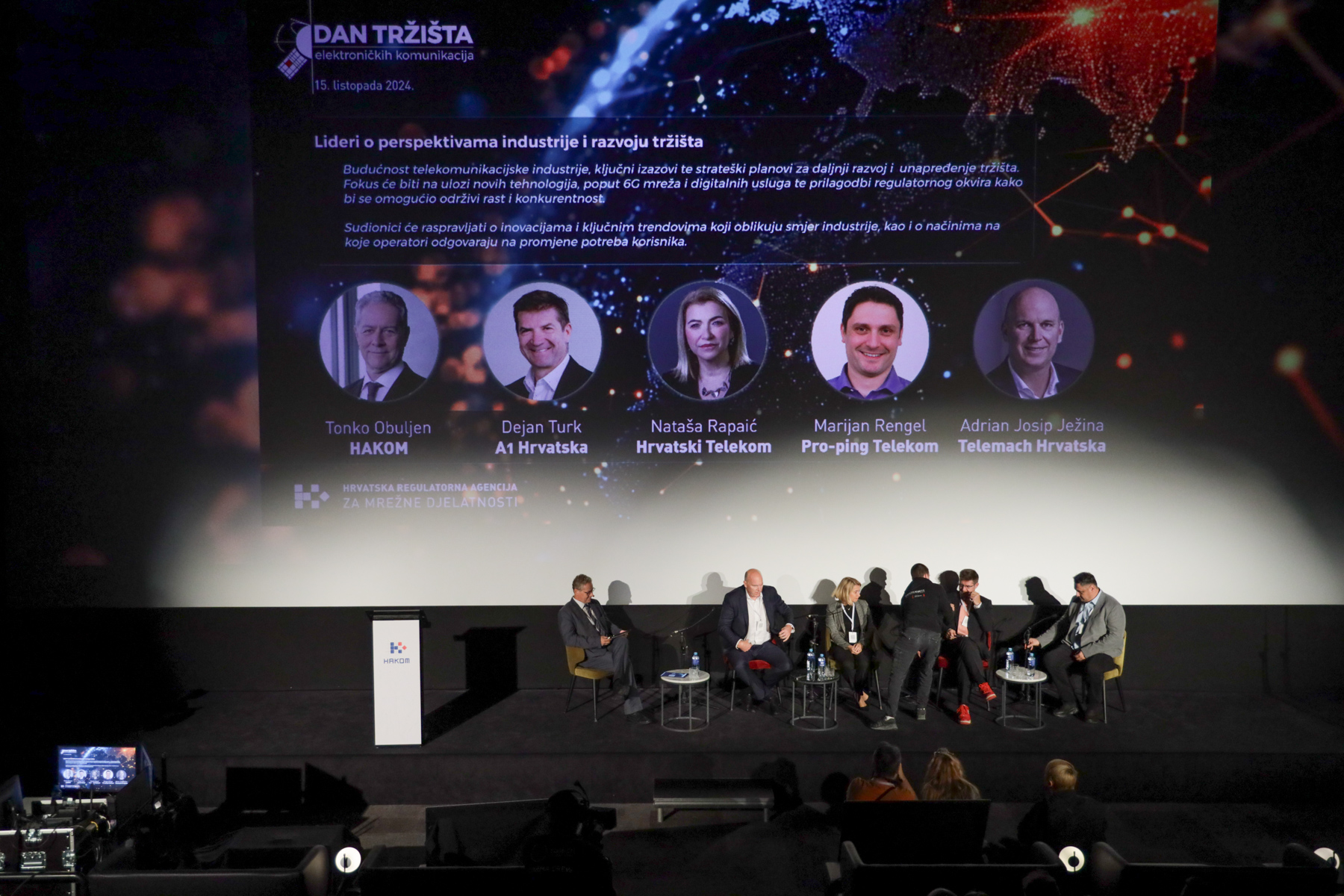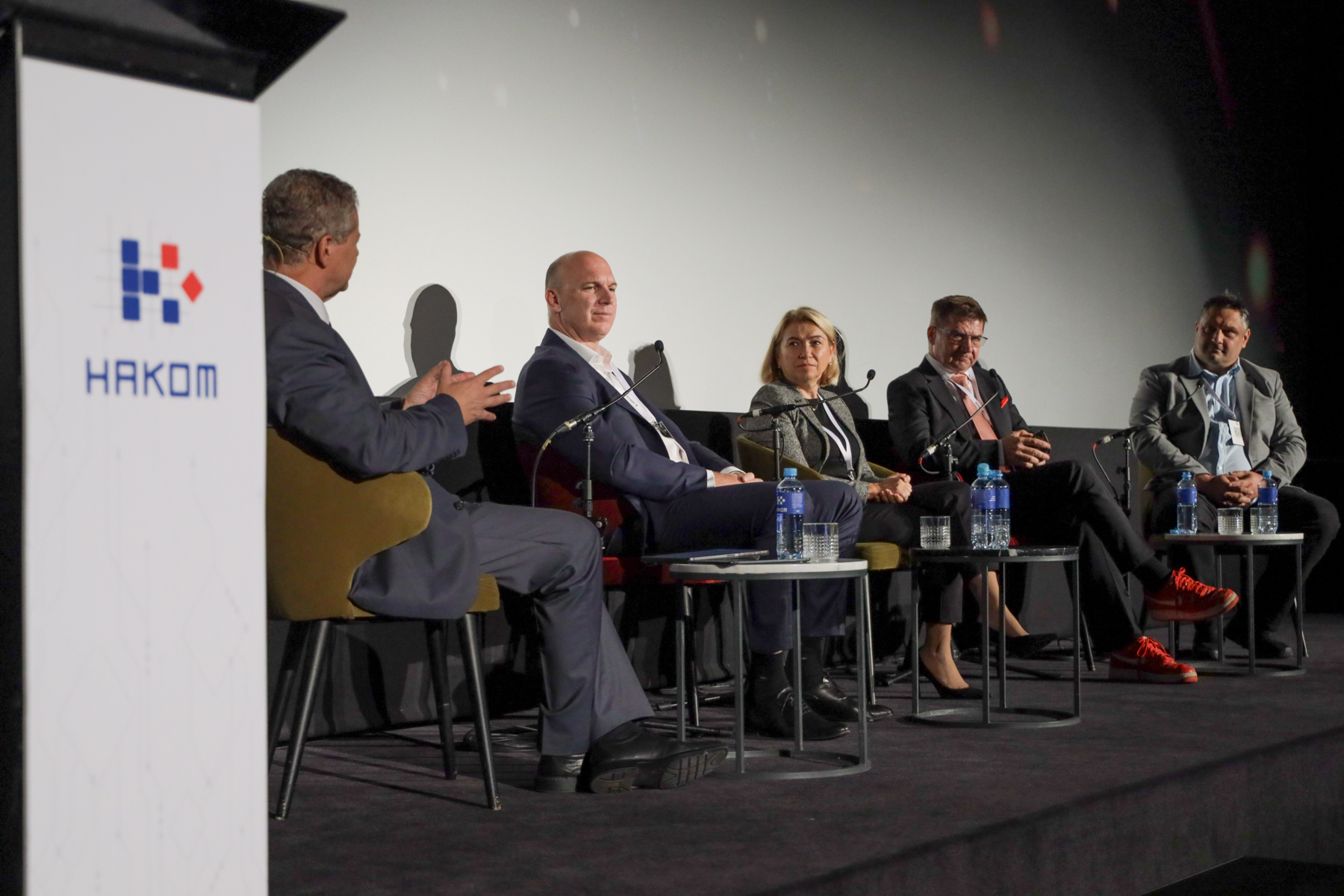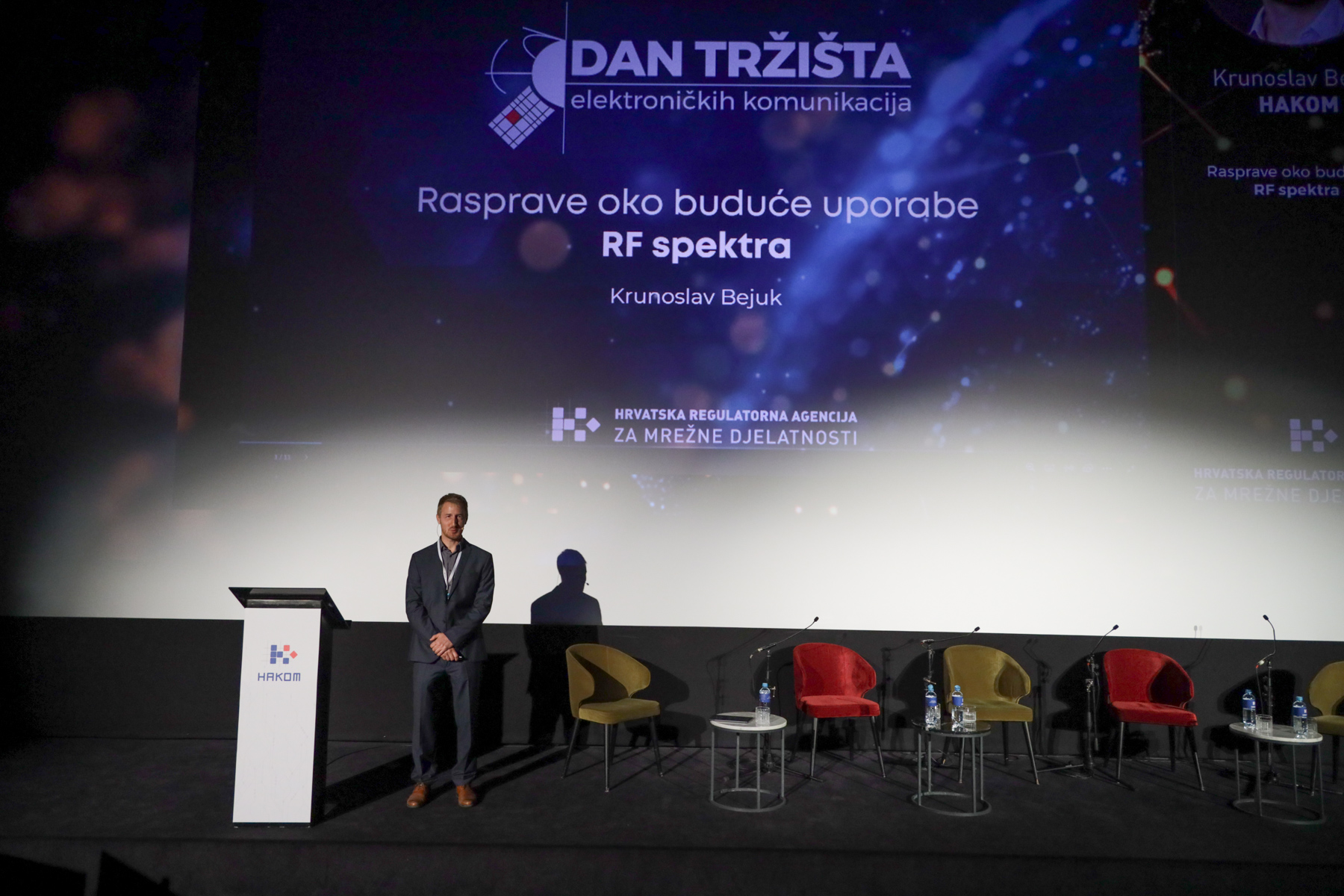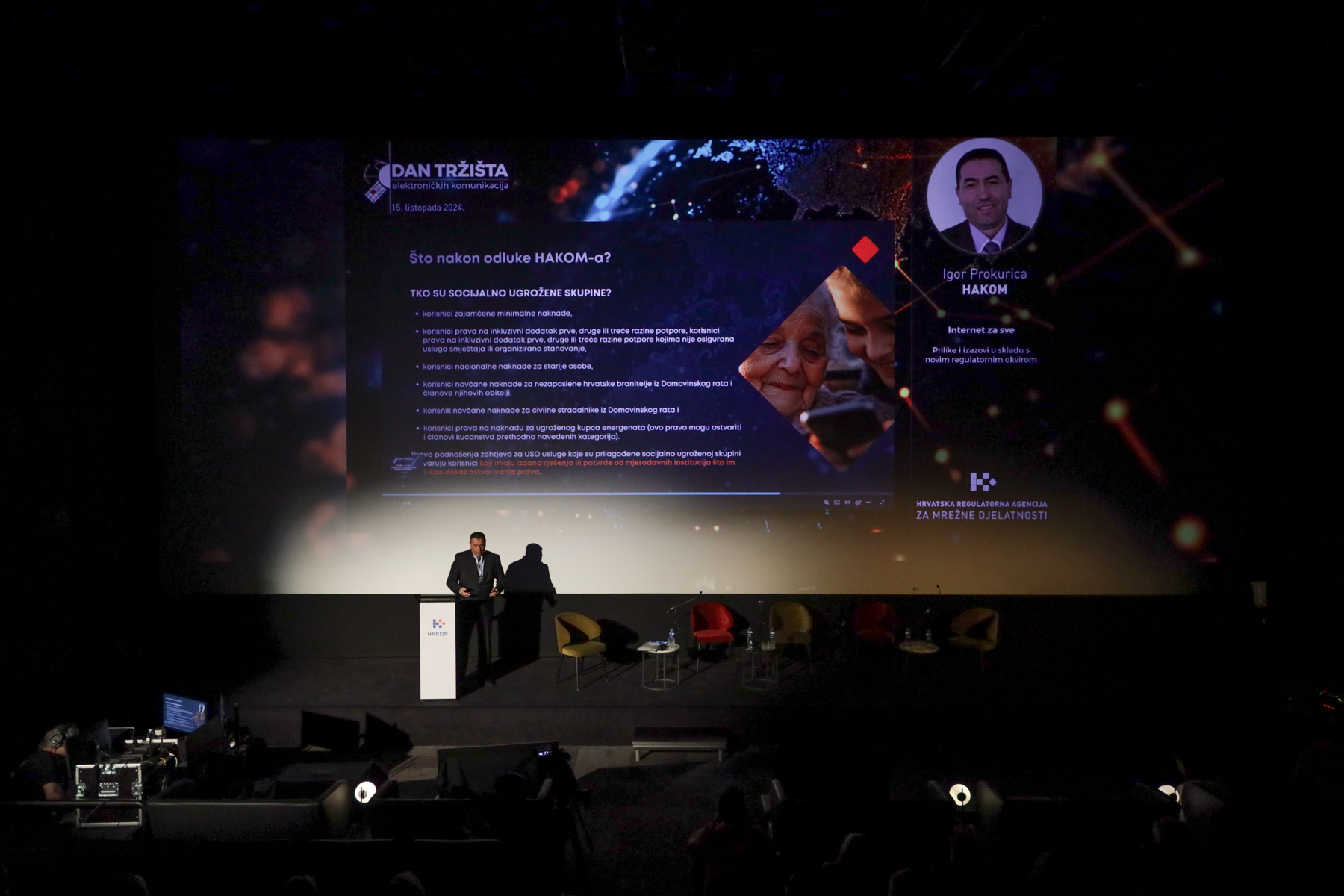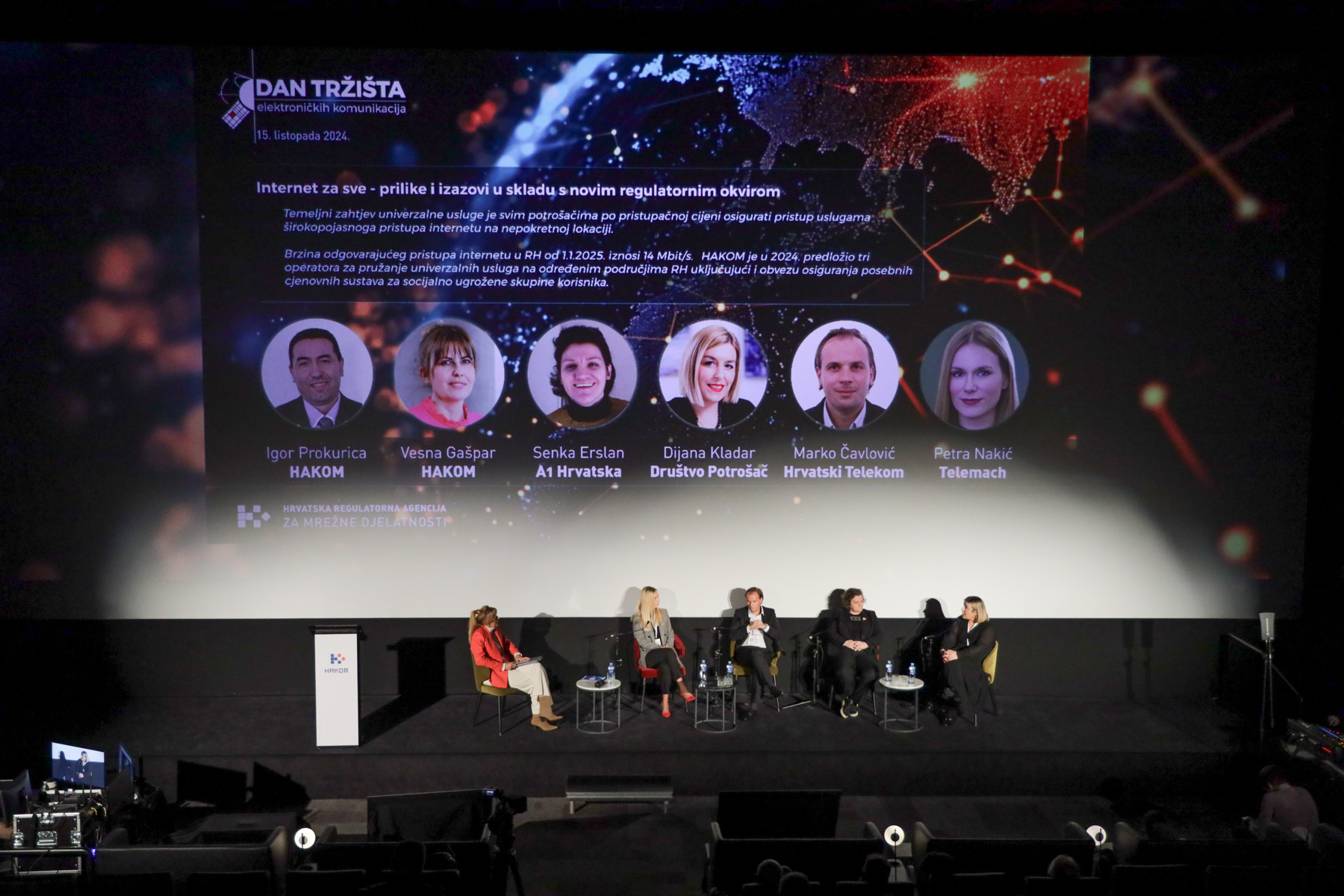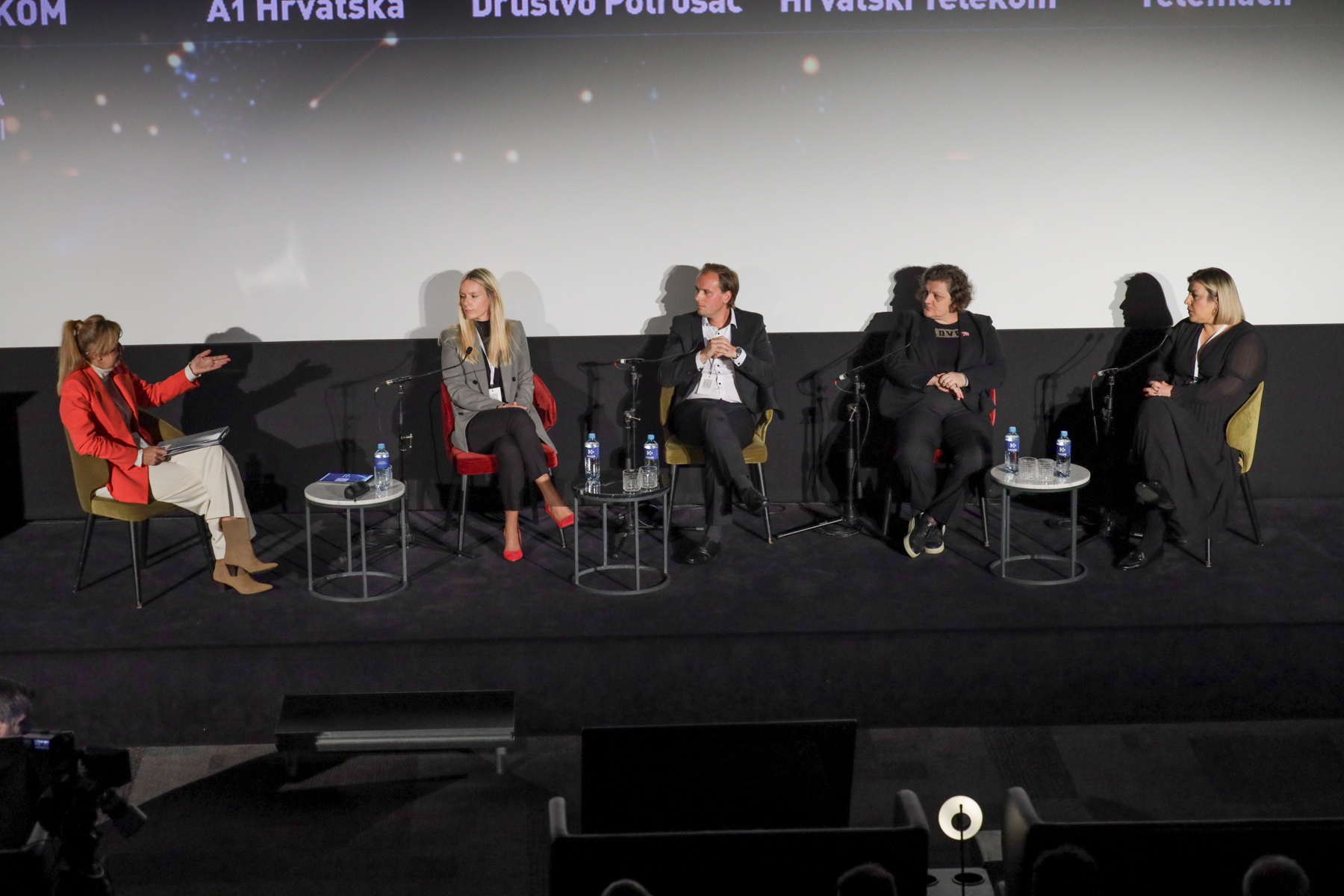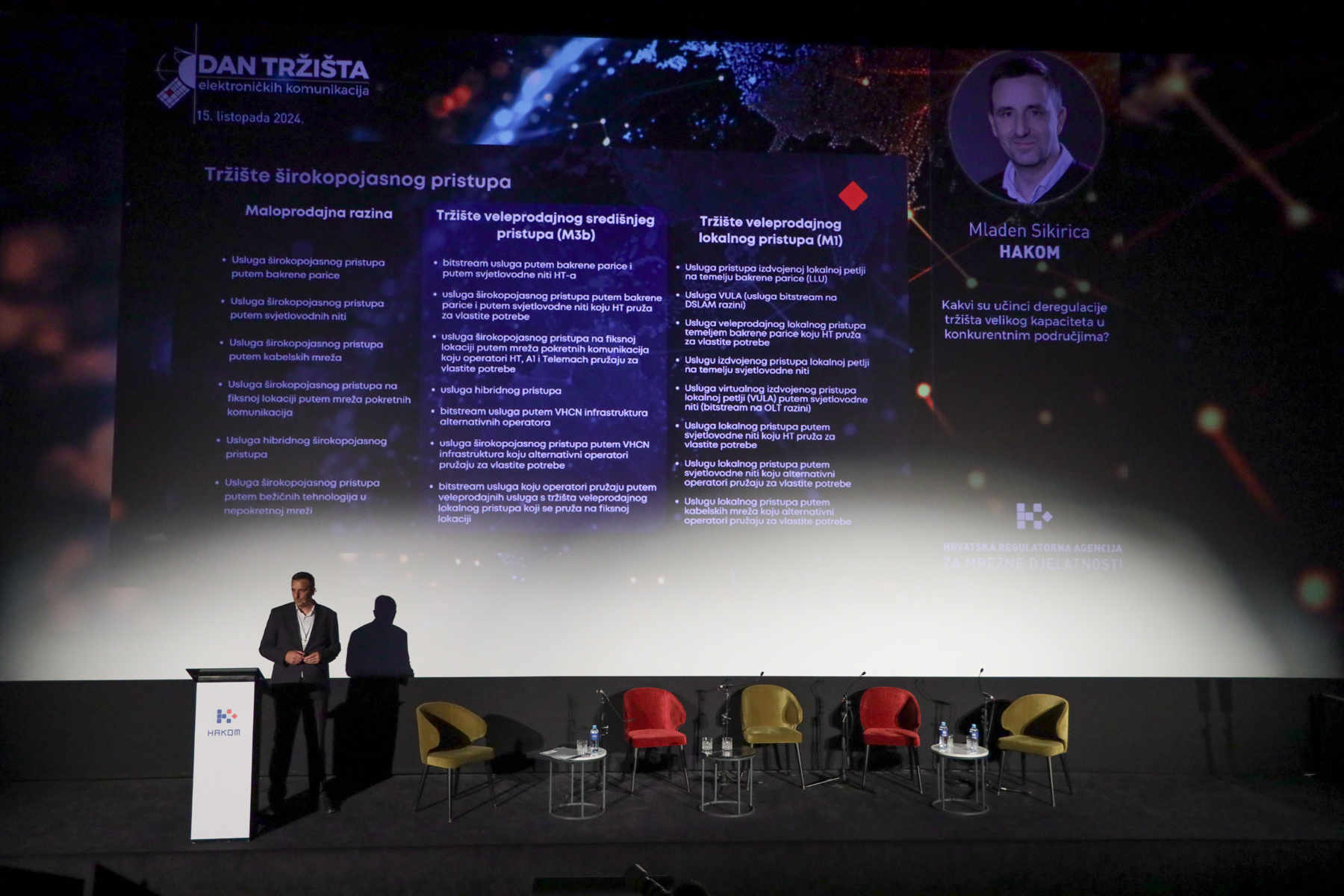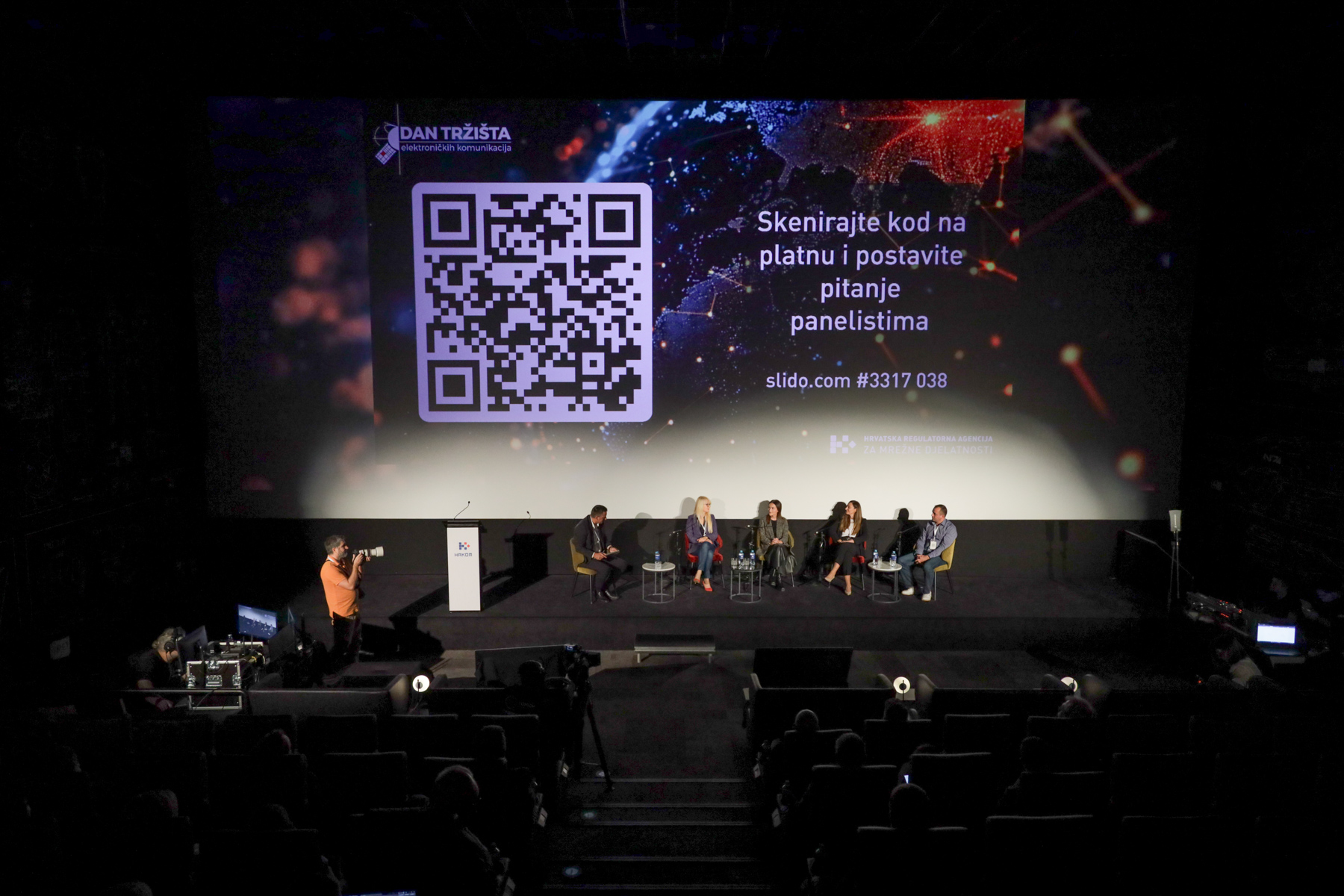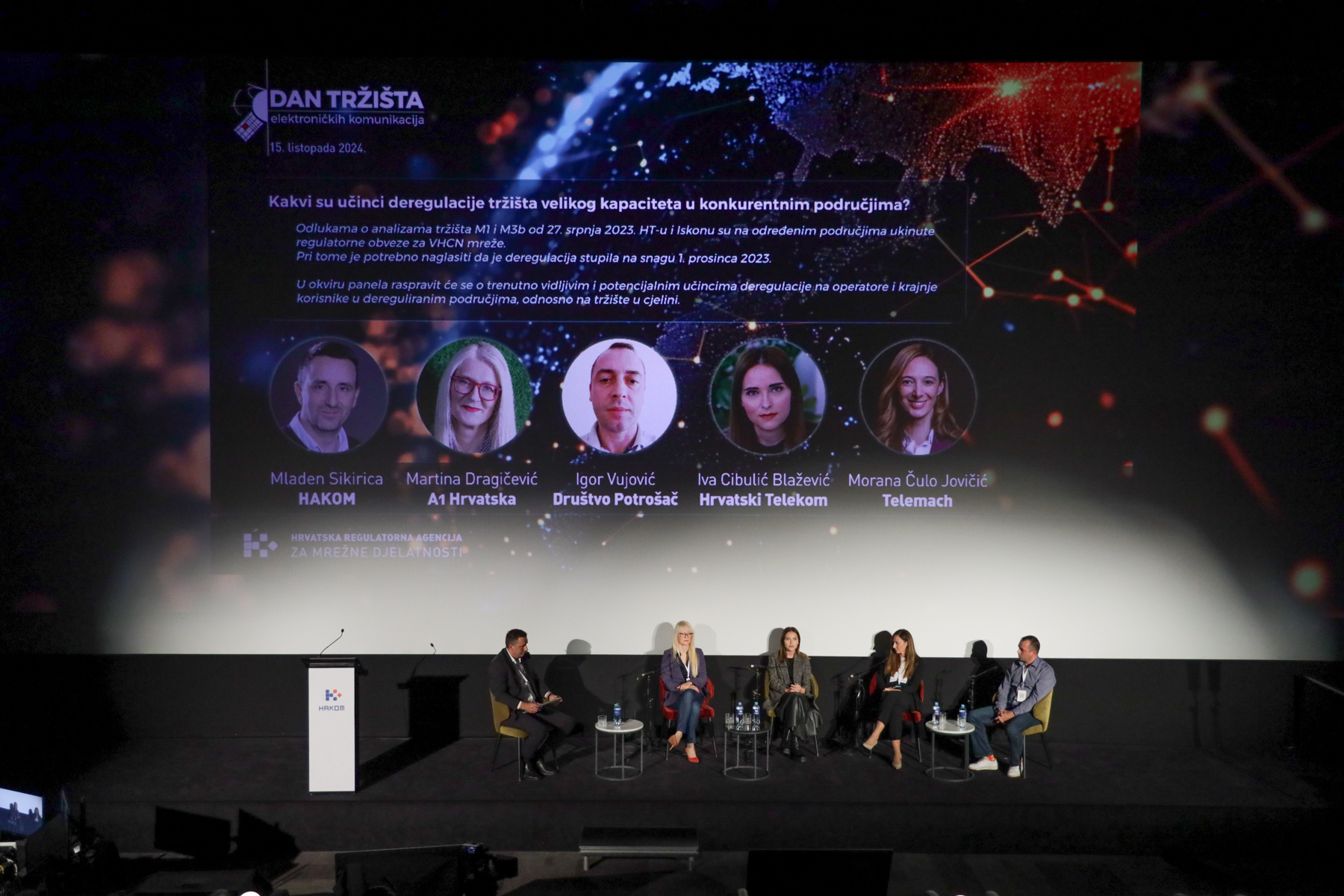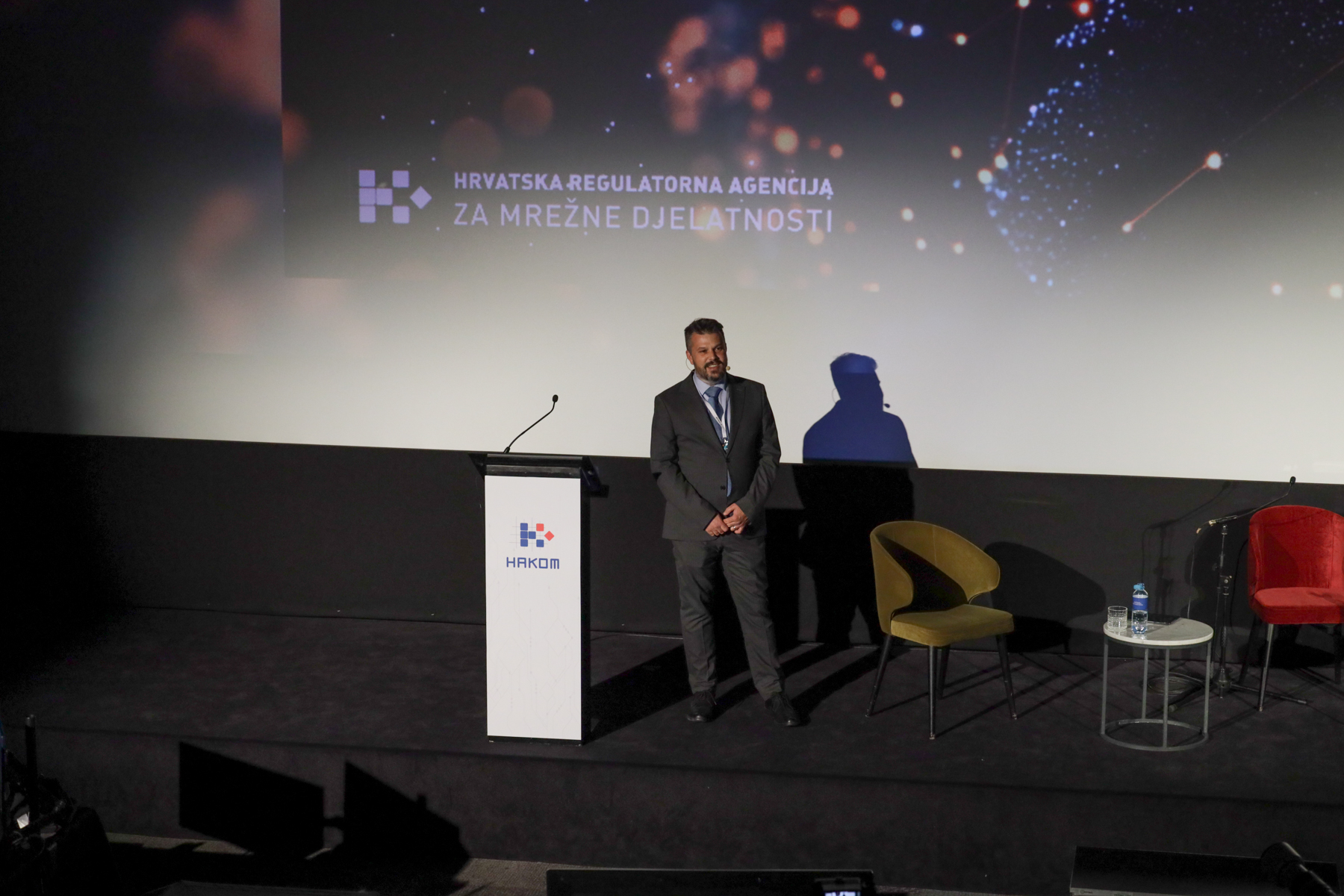HAKOM's 11th Market Day: The Electronic Communications Market Saw Significant Progress in the Past Year
ZAGREB, 15 October 2024 - The Croatian Regulatory Authority for Network Industries (HAKOM) held its traditional 11th Market Day for Electronic Communications, a conference where the most important activities in the ever-dynamic market were presented, with a focus on industry perspectives and development, the effects of deregulation, the future use of RF spectrum as a limited national resource, and changes that will bring new opportunities for universal service users. Through four panels, the conference provided an opportunity for the regulator and stakeholders to share their opinions, experiences, and examples of good practices and contribute to changes in this challenging market through open dialogue. The conference was opened by Tonko Obuljen, President of HAKOM's Council, who highlighted that Market Day has become a central event for the telecommunications industry and a valuable platform for discussing challenges and opportunities. Speaking about market development, Obuljen emphasised the implementation of 5G networks and continued investment in high-capacity networks, which are crucial for the development of the digital economy. He added that there is a need for further investment to achieve the goals of the Digital Agenda. Obstacles still exist but HAKOM will keep striving to eliminate them.. Compared to other EU member states, the electronic communications market made significant progress in the past year, but there is still room to reach the most developed countries. The goal and purpose of the regulator is to support the further development of the market while ensuring that users' rights remain protected. "The challenges of cybersecurity are increasing with the rise of digitalisation. The new digital economy requires us to constantly improve and enhance security. The entire world is facing sustainable development goals, and our sector plays a key role," said Obuljen, who moderated a panel discussion featuring leaders from Croatian telecommunications companies.
Leaders on Industry Perspectives and Market Development
The topic of the opening panel was the future of the telecommunications industry, key challenges, and strategic plans for further development and market improvement. Dejan Turk (A1 Croatia), Nataša Rapaić (Croatian Telecom), Marijan Rengel (Pro-ping Telekom), and Adrian Josip Ježina (Telemach Croatia) participated in the discussion. The focus of the discussion was on issues related to the role of new technologies such as 6G networks and digital services, as well as adapting the regulatory framework to enable sustainable growth and competitiveness. The participants discussed innovations and key trends shaping the direction of the industry, as well as how operators are responding to changing customer needs.
A central point of the discussion was the White Paper published by the European Commission in February this year, which will bring changes to some regulations. Topics included the shutdown of the copper network, investments in the development of fibre-optic infrastructure, voucher schemes aimed at encouraging users to switch to fibre infrastructure, sustainability, and efforts by operators to make their businesses greener, as well as the cloudification of networks. The operators expressed concern and dissatisfaction with the unregulated position of OTT players.
"It is not logical that major OTT players are not regulated at all. Due to the fact that HT invested €320 million in the network last year alone, it is not logical that OTT players, who are our competitors, are not paying. It is essential for us to offer the best service to our customers, but on the other hand, it is not sustainable for someone to use the network without investing in it. I think this is unsustainable. I welcome the White Paper and believe it will help us in legal proceedings in situations where we are practically at war with OTT players," highlighted Nataša Rapaić.
The development of the internet, which has transitioned to flat-rate models, allowed OTT players to emerge on a global level, and they now hold a dominant position. What's important to note is that 70% of data on the network comes from large global players who pay taxes elsewhere, while the cost of network investment falls on telecom operators. A sustainable coexistence needs to be found in sharing this 'pie' because the current situation is unsustainable in the long term. One key aspect that has not happened yet, but could, is so-called RCS (Rich Communication Services). Currently, Apple and Android, who have 100% of the software on mobile phones, aim to take over the system and bypass the operators. This distorts the entire competition, leaving users without any choice. The takeover of this space will result in further domination by two global operators, who are not under any European control, seizing an entire branch of the telecom industry. European regulatory bodies, at least concerning the EU, should act to prevent this from happening, ideally before it occurs," said Ježina.
"The common point of view of all operators is that we all invest in network development, while others heavily use them. With the rise of AI, this burden will increase significantly, leading to situations where we will need to find solutions regarding content monitoring and charging. At A1, we’ve already started forming partnerships, for instance, with Netflix, WhatsApp, and Facebook. Providers likely see us as an obstacle in some of their processes. For instance, Elon Musk's plans for creating a satellite mobile phone are well known," pointed out Turk.
Operators support the White Paper and believe it makes sense in the context of what the European Commission is proposing today. They argue that it is unreasonable to set a fixed date for the shutdown of the copper network that applies uniformly to all EU countries. Preconditions must be established for the shutdown, including the development of optical infrastructure in every corner of the country. In the long term, fibre-optic technology is the only sustainable option. Croatia has a significant number of users on the copper network, which will need to be phased out at some point, but this should be done in a planned manner, supported by vouchers with clear conditions, without monopolising the market. Operators still do not sufficiently utilise each other’s networks, opting instead to build their own in parallel. This is not beneficial, according to Marijan Rengel, who heads a small company building a network in the Slavonia and Podravina regions.
"There are many undeveloped rural areas, and I hope we will move towards legislation that encourages the use of existing infrastructure. We have developed rural areas and built networks, and now we are struggling for survival," he stated, calling for greater collaboration among larger players.
Discussions on the Future of the RF Spectrum
At the previous World Radiocommunication Conference, which shapes the future of radiocommunications globally, the 470-694 MHz band was allocated on a secondary basis for mobile services, while the 6425-7125 MHz band was designated for IMT (International Mobile Telecommunications). However, Europe has yet to decide the fate of these bands. Two prominent topics currently under discussion are whether DTV (Digital Terrestrial Television) will require the UHF spectrum until 2030 and what the transition dynamics to new technologies should be. Additionally, there isa debate over whether the U6 GHz band should be divided into RLAN (Radio Local Area Network) and IMT portions or if there is a way for them to coexist, and whether there is still room for new IMT bands.
These questions are currently being addressed in EU working bodies and represent a "hot topic" in the strategy for utilising RF resources. Krunoslav Bejuk, the chief expert on RF spectrum management at HAKOM, spoke on these issues.
Bejuk briefed attendees on the outcomes of the previous WRC, including the documents and resolutions that were adopted, as well as those that will be discussed at the next conference scheduled for 2027.
"The EU does not start from the same initial positions, and it is necessary to determine a common goal. There is a wide range of different spectrum usage among European countries. Some countries are more reliant on broadcasting, while others are less so and are prepared to make the transition sooner. Similarly, some countries see the need to open new bands for future generations of mobile networks, while others simultaneously consider home wireless networks as the 'bottleneck' for broadband networks. In any case, Europe needs to reach an agreement on band usage by 2027, ahead of the next WRC," he stated.
Internet for All
“Internet for All - Opportunities and Challenges in Accordance with the New Regulatory Framework” was the topic of a panel with the following participants ;Vesna Gašpar from HAKOM, Senka Erslan (A1 Croatia), Dijana Kladar (Consumer Society), Marko Čavlović (Croatian Telecom), and Petra Nakić (Telemach Croatia).
The keynote speaker was Igor Prokurica from HAKOM, who briefed attendees on the obligations associated with providing universal services in electronic communications, as well as what to expect once HAKOM announces the Universal Service Obligation (USO) operator." “When we started the project to determine the USO operator, we conducted a Quality Analysis and concluded that it is necessary to ensure access to available services at an affordable price, establish public payphones, and offer affordable tariff options or packages tailored to socially vulnerable user groups across Croatia. We simultaneously worked on drafting regulations and launched a public tender for selecting the operator over the summer. Since no operator applied, we requested a statement from them, and then prepared a proposal for a decision that was open for public consultation; we are now in the process of making a final decision,” emphasised Prokurica, noting that the approval of retail prices is forthcoming. Continuous support for operators of USO services is also being provided.
By the end of 2024, according to data from the Analysis, more than 80% of users will be using speeds of at least 20 mb/s or 14 mb/s in the downstream direction. Therefore, HAKOM has decided to increase the previous speed of 7 mb/s to 14 mb/s for downstream services. All users living in the areas where the infrastructure necessary to ensure adequate internet access and voice communication is not available would be entitled to the service, which has now also been extended to micro-enterprises and non-profit organisations. The users will have the right to service prices, with the monthly fee for the social package not exceeding €6.77, including VAT. From 1 January 2025, HT will not be the only USO operator, as this obligation will also extend to other operators. Regarding availability, HT will be the USO operator in all geographical units, A1 in 19 units, and Telemach in five geographical units. As for price accessibility, all three operators will be designated as such throughout the entire territory of Croatia.
“HAKOM has set a significant challenge for us, as the speed has doubled, and the deadline for implementation is only six months. When we look at other EU countries, Croatia will rank among the top five after this, which shows that our demand for a transitional speed of 10 mb/s was not unreasonable. However, we will adapt, we are working on this, and we will be ready,” said Čavlović, reminding that there are areas where it is impossible to provide a speed of 14 mb/s without significant investment. EU funds may assist in addressing part of the problem.
“We are ready to provide significantly higher speeds where we have our own network, which is the result of continuous investment. We have issues with regulations and their implementation, as well as some challenges with local self-government. We expect to have an obligation to deliver in 19 geographical areas, but in some units, the provision of services is uncertain, as we know that processes are often lengthy and obtaining certain permits can be very challenging. We always want new users and to provide them with the best service, but we are aware of the difficulties that may arise and which we all may encounter,” highlighted Senka Erslan.
“We can provide an even faster service on our infrastructure. We are ready, and we will tackle the challenges we face with the support of the regulator,” said Petra Nakić.
“The right to internet access today is akin to the right to water, as everything happens online. Everyone should have access, especially socially vulnerable citizens who need to be educated about various scams. Without internet access, we are deprived of many services,” noted Dijana Kladar.
Operators emphasised that they have a short adjustment period, as two operators (A1 and Telemach) lack experience with the service and require preparations that they are currently working on. They are still able to assess the scope or significance of the obligation but are intensively preparing with the support of HAKOM's expert service, which they continue to rely on. HT has experience and does not expect significant changes in practice. However, HT believes that all three operators should equally participate throughout the territory via mobile networks, as A1 and Telemach networks are also available and of good quality, which would contribute to a certain level of equality.
On the Effects of Deregulation in the High-Capacity Market in Competitive Areas
The concluding panel discussion on "What Are the Effects of Deregulation in the High-Capacity Market in Competitive Areas?" brought together prominent speakers. Participants included Mladen Sikirica (HAKOM), Martina Dragičević (A1 Croatia), Igor Vujović (Consumer Society), Iva Cibulić Blažević (Croatian Telecom), and Morana Čulo Jovičić (Telemach Croatia). To recap, the Decisions regarding market analyses M1 and M3b issued on 27 July 2023 resulted in the removal of regulatory obligations for VHCN (Very High-Capacity Network) from HT and Iskon in certain areas. It is essential to note that deregulation will take effect on 1 December 2023. The panel discussed the currently visible and potential effects of deregulation on operators and end users in deregulated areas, as well as on the market as a whole.
Mladen Sikirica spoke about market indicators one year after deregulation, noting that there have not been any dramatic negative effects, contrary to operators' warnings, and emphasised that the results of deregulation are continuously monitored and analysed.
“We are aware that our market shares have grown over the past year, but I wouldn’t attribute this to the effects of deregulation. I don’t see significant positive effects; I see indications of some negative consequences. Statistics can both reveal and obscure information. Every indicator needs a deeper analysis to uncover the true effects,” noted Morana Čulo Jovičić, who reminded the audience that they had raised concerns about the dynamics and method of how the market was divided.
“Factually, since HT has reduced its commercial retail offers in deregulated areas, other operators had little choice but to follow this retail trend, so competition has now focused precisely on deregulated areas. Operators are competing in these areas through pricing, which means we cannot discuss a real margin that allows for further investment unless one has a wealthy investment fund backing them. One of the goals of further investments has not been achieved. Publicly available data from HAKOM and public discussions show an 8.5% increase in HT's share in the high-capacity market, as well as an increase in market share in the low-capacity market,” highlighted Martina Dragičević.
Iva Cibulić Blažević stated that, a year after deregulation, there are no market disruptions and nothing dramatic has changed. “All alternative operators are performing very well; their shares are increasing, which supports our thesis from the beginning that HT, although the leading player in the market, no longer possesses the strength to justify continued regulation. The market is mature enough for competition to stand on its own, and services are provided in a way that allows operators to compete for customers on equal terms,” she asserted.
Igor Vujević from the Consumer Society remarked that for consumers, the most important factors are price and the monthly bill. The concept of regulation and deregulation is science fiction to them. They care less about whether they have fibre or copper; what matters to them is having fast internet and choices.
All Reflections Are an Important Contribution to Shaping the Future of the Market
The Executive Director at HAKOM, Mr Miran Gosta, expressed his gratitude to the panellists and moderators for their participation and contributions to this constructive conference, as well as to the content creators and organisers from the HAKOM professional service. He also thanked attendees for their questions, comments, and reflections, which will be considered in shaping the future of the electronic communications market in Croatia.
For additional information please contact:
Croatian Regulatory Authority for Network Industries (HAKOM)
- Roberta Frangeša-Mihanovića 9 Street
- 10110 Zagreb, Croatia
- Tel. + 385 (0) 1 700 70 07
- Fax + 385 (0)1 700 70 70
Media inquiries can be submitted online using HAKOM’s official website: www.hakom.hr
About Hakom
HAKOM - Croatian Regulatory Authority for Network Industries – ensures preconditions for a fair market competition, stable growth and environment for innovations in the electronic communications and postal services market. HAKOM protects users’ interests and the possibility of choice among various communications and postal services at affordable prices, defines sustainable competitive conditions for operators and service providers under fair conditions for return on investment, and provides support to economic growth, public services and the quality of life in the Republic of Croatia by using modern technologies. HAKOM’ strategic goals are: to promote regulation of the electronic communications and postal services market, to support growth of investments and innovations in the electronic communications and postal services market, to provide efficient use of limited resources, to accelerate the growth of broadband products and services, to provide affordable offers of communications and postal services, to provide protection and informing of users, to build an efficient and comprehensive information system, to define and implement efficient processes, and to acquire multi-disciplinary expertise in market regulation.

